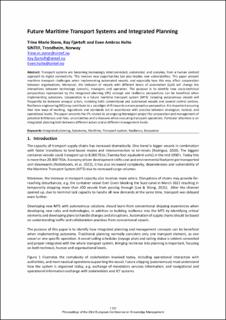| dc.contributor.author | Stene, Trine Marie | |
| dc.contributor.author | Fjørtoft, Kay Endre | |
| dc.contributor.author | Holte, Even Ambros | |
| dc.date.accessioned | 2023-01-04T08:32:21Z | |
| dc.date.available | 2023-01-04T08:32:21Z | |
| dc.date.created | 2022-11-01T09:26:11Z | |
| dc.date.issued | 2022 | |
| dc.identifier.isbn | 978-1-914587-47-4 | |
| dc.identifier.uri | https://hdl.handle.net/11250/3040830 | |
| dc.description.abstract | Future Maritime Transport Systems and Integrated Planning | en_US |
| dc.description.abstract | Transport systems are becoming increasingly interconnected, automated, and complex, from a human centred approach to digital connectivity. This involves new opportunities but also implies new vulnerabilities. This paper present maritime transport challenges when implementing automated vessels, and especially how this may affect cooperation between organisations. Moreover, the inclusion of vessels with different levels of automation (LoA) will change the interactions between technology ( vessels), managers and operators. The purpose is to identify how socio-technical perspectives represented by the Integrated planning (IPL) concept and resilience perspectives can be beneficial when implementing autonomy. Cooperation in a future maritime transport system (MTS) including autonomous vessels will frequently be between unequal actors, involving both conventional and automated vessels and several control centres. Resilience engineering (RE) may contribute to a paradigm shift towards a more proactive perspective. It is important ensuringthat new ways of working, regulations and standards are in accordance with practice between strategical, tactical, and operational levels. The paper presents the IPL rela ted to an ongoing Norwegian project for preparation and management ofpotential brittleness and risks, uncertainties and unknowns when executing transport operations. Particular attention is on integrated planning both between different actors and at different management levels. | en_US |
| dc.language.iso | eng | en_US |
| dc.publisher | Academic Conferences International Limited Curtis Farm | en_US |
| dc.relation.ispartof | Proceedings of the 23rd European Conference on Knowledge Management Vol. 23 No. 2 (2022) | |
| dc.rights | Attribution-NonCommercial-NoDerivatives 4.0 Internasjonal | * |
| dc.rights.uri | http://creativecommons.org/licenses/by-nc-nd/4.0/deed.no | * |
| dc.subject | Ecosystem | en_US |
| dc.subject | Resilience | en_US |
| dc.subject | Transport system | en_US |
| dc.subject | Maritime | en_US |
| dc.subject | Autonomy | en_US |
| dc.subject | Integrated planning | en_US |
| dc.title | Future Maritime Transport Systems and Integrated Planning | en_US |
| dc.title.alternative | Future Maritime Transport Systems and Integrated Planning | en_US |
| dc.type | Chapter | en_US |
| dc.type | Peer reviewed | en_US |
| dc.description.version | publishedVersion | en_US |
| dc.rights.holder | Copyright (c) 2022 European Conference on Knowledge Management | en_US |
| dc.source.pagenumber | 1131-1139 | en_US |
| dc.identifier.doi | 10.34190/eckm.23.2.816 | |
| dc.identifier.cristin | 2067162 | |
| dc.relation.project | Norges forskningsråd: 324726 | en_US |
| cristin.ispublished | true | |
| cristin.fulltext | original | |
| cristin.qualitycode | 1 | |

